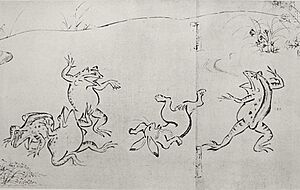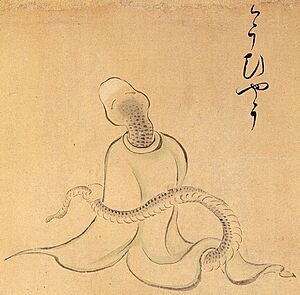Toba Sōjō facts for kids
Kakuyū (born in 1053, died in 1140) was a famous Japanese artist and a Buddhist monk. He was also known as Toba Sōjō, which means "Bishop of Toba." His father was Minamoto no Takakuni.
Who Was Kakuyū?
Kakuyū was a very important priest in a type of Buddhism called Tendai Buddhism. He rose through the ranks of the church. In 1132, he became a "bishop" (sōjō). Just two years later, in 1134, he was promoted to "archbishop" (dai-sōjō).
In 1138, he became the 48th "head priest" (zasu) of the entire Tendai school. This was a very high position. He got the name Toba Sōjō because he lived at a temple called Shō-kongō'in. This temple was in Toba, Kyoto, and was supported by the emperor's family.
Kakuyū's Artworks
Kakuyū was not only a religious leader but also a talented artist. He was skilled at creating both Buddhist art and funny, cartoon-like drawings. One of his confirmed works is a statue called Fudōmyō'ō-ritsuzō. This statue is kept at Daigo-ji temple and is considered an Important Cultural Property of Japan.
Perhaps his most famous work is a long picture scroll called Chōjū-giga. This scroll is a National Treasure of Japan. It is also thought to be one of the earliest examples of manga, which are Japanese comics. However, it's important to know that there isn't full proof that Kakuyū definitely created Chōjū-giga.
You can find some of Kakuyū's artworks in major museums today. His pieces are part of the permanent collections at the Metropolitan Museum of Art and the University of Michigan Museum of Art.
 | Emma Amos |
 | Edward Mitchell Bannister |
 | Larry D. Alexander |
 | Ernie Barnes |



